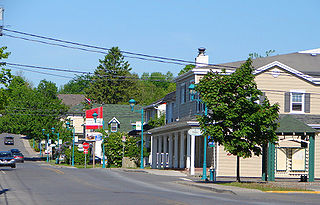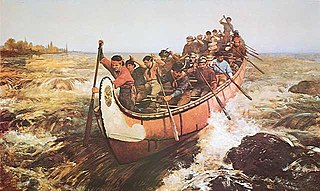Voyageurs are professional canoemen who transported furs by canoe during the fur-trade era in North America.
Contents
Voyageur may also refer to:
Voyageurs are professional canoemen who transported furs by canoe during the fur-trade era in North America.
Voyageur may also refer to:
Columbia may refer to:

Port Coquitlam is a city in British Columbia, Canada. It is one of 21 municipalities comprising Metro Vancouver. Located 27 km (17 mi) east of Vancouver, it is on the north bank of the confluence of the Fraser River and the Pitt River. Coquitlam borders it to the north and west. Pitt Meadows lies across the Pitt River from it. Port Coquitlam is bisected by Lougheed Highway and the Canadian Pacific Kansas City. Port Coquitlam is often referred to as "PoCo". It is Canada's 93rd-largest municipality by population.

Châteauguay is an off-island suburb of Montreal, in southwestern Quebec, located both on the Chateauguay River and Lac St-Louis, which is a section of the St. Lawrence River. The population of the city of Châteauguay at the 2021 Census was 50,815, and the population centre was 75,891.
Evolution is change in heritable traits of biological organisms over successive generations.
Discovery may refer to:

Saint-Lazare is an off-island suburb of Montreal, in southwestern Quebec, Canada in the Regional County Municipality of Vaudreuil-Soulanges.
A storm is a severe weather condition.

The ceinture fléchée[sɛ̃tyʁ fleʃe] or L'Assomption sash is a type of colourful sash, a traditional piece of Québécois clothing linked to at least the 17th century. The Métis also adopted and made ceintures fléchées and use them as part of their national regalia. Québécois and Métis communities share the sash as an important part of their distinct cultural heritages, nationalities, attires, histories and resistances. While the traditional view is that the ceinture fléchée is a Québécois invention, other origins have been suggested as well including the traditional fingerwoven Gaelic crios. According to Dorothy K. Burnham who prepared an exhibit on textiles at the National Gallery of Canada in 1981, and published an accompanying catalogue raisonné, this type of finger weaving was learned by residents of New France from Indigenous peoples. With European wool-materials, the syncretism and unification of Northern French and Indigenous finger-weaving techniques resulted in the making of Arrowed Sashes. L'Assomption Sash is the oldest known sash design; produced by Québécois habitants or artisans.
Green is a color.
Saint is the designation of a holy person.

Orleans is a suburb of Ottawa, Ontario, Canada. It is located in the east end of the city along the Ottawa River, about 16 km (10 mi) from Downtown Ottawa. The Canada 2021 Census determined that Orléans' population was 125,937. Prior to being amalgamated into Ottawa in 2001, the community of Orléans was spread over two municipal jurisdictions, the eastern portion being in the pre-amalgamation City of Cumberland, the western portion in the City of Gloucester. According to the 2021 census, 75,453 people lived in the Cumberland portion of Orleans, while 50,484 people lived in the Gloucester portion. Today, Orléans spans the municipal wards of Orléans East-Cumberland, Orléans West-Innes, and Orléans South-Navan. Orléans contains a significant francophone population.
Fury or FURY may refer to:

Franco-Columbians are French Canadians or Canadian francophones living in the province of British Columbia. According to the 2016 Canadian Census, 71,705 residents of the province stated that French is their mother tongue. In the same census, 388,815 British Columbians claimed full or partial French ancestry.
A dragon is a legendary creature, typically with reptile-like traits.
Walnut Grove is a town centre located within the Township of Langley, British Columbia.

The Festival du Voyageur is an annual 10-day winter festival that takes place in Winnipeg, Manitoba, Canada. The event is held during each February in Winnipeg's French quarter, Saint-Boniface, and is western Canada's largest winter festival. It celebrates Canada's fur-trading past and unique French heritage and culture through entertainment, arts and crafts, music, exhibits, and displays.
Boum may refer to one of the following:
La Source is the French for the source or the spring (water). It may also refer to:

Voyageurs were 18th and 19th century French Canadians who transported furs by canoe at the peak of the North American fur trade. The emblematic meaning of the term applies to places and times where that transportation was over long distances. The voyageurs' strength and endurance was regarded as legendary. They were celebrated in folklore and music. For reasons of promised celebrity status and wealth, this position was coveted.
The lion is a big cat of the species Panthera leo that inhabits the African continent and one forest in India.